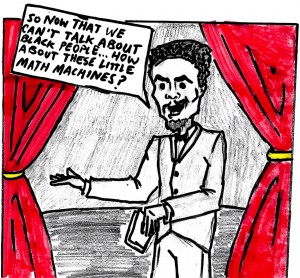Protests highlight yet another Oscars failure
Last week, Dawn Hudson, CEO of the Academy of Motion Picture Arts and Sciences, responded to a letter written from George Takei, Ang Lee and 23 other members of the Academy of Asian descent. The letter outlined the offensiveness of the joke with the statement, “It certainly was never the Academy’s intent to offend anyone.” Perhaps not — but, as George Takei said in his interview with The Hollywood Reporter, “[The Academy] had oversight of the whole thing. They knew what was going to be presented.” And when host Chris Rock introduced Asian children wearing suits and carrying briefcases, the stand against racism in the industry faded as another classic racist joke emerged — one that had been drowned out by other, louder issues.
The joke in question happened during the telecast when three small children walked up on stage with confused expressions plastered on their faces, dressed as accountants — because obviously, that’s what Asian American children will grow up to be while those in China go on to make our smartphones. Child labor in China was met with laughter. Stereotypes were deemed racist to one group yet entertaining to another. The Academy’s willingness to throw an ignorantly outrageous and racist joke in the face of the Asian community forces the industry to take a step back, the community to stand up, and society to reflect on the mistakes and sufferings of the past for a move toward a more inclusive future.
As usual, the token Asian — in this case three Asians — was categorized and stereotyped in an attempt to diversify the Oscars, yet the joke didn’t rub anyone the wrong way during the rehearsal. Here’s to the Academy, the entertainment industry, the studios, the directors, the writers, the producers: Making an ethnic group the laughingstock for entertainment merely because of their culture, traditions, appearance or the country’s problems is not acceptable, and it definitely is not funny.
USC is not excluded from a climate rife with the normalcy of the hardworking Asian archetype that speaks volumes to the individual racism that Asian students face. Earlier this month, eggs and racial slurs were thrown at a sophomore and Hong Kong native at Cardinal Gardens apartments. As a University that prides itself in being the forerunner for diversity, the community acts otherwise. We need to stop being stubborn about what we think we know in order to start seeing individuals as individuals instead of groups of minorities. Not just at USC — but all of America.
The Oscars stage, which was meant to be a platform for diversity, has been twisted to become a platform for ignorance. The cold words that have enraged, hurt and belittled the Asian community and Asians around the world shows how far Hollywood and America have to go.
But this issue is bigger than one ethnic population in the United States. It incorporates the minority and the majority, the included and the excluded and the labeled and the stereotyped; it means humanity. It means that the Academy must push racial boundaries because art and talent has nothing to do with race. As director Alejandro Iñárritu put it in his Oscars speech this year, “the color of the skin become as irrelevant as the length of our hair.”
However, this uproar is also an opportunity. An analysis of racial and gender representation published by the Media, Diversity & Social Change Initiative at the Annenberg School for Communication and Journalism found that over half of “cinematic, television, or streaming stories fail to portray one speaking or named Asian or Asian American on screen.”
America has the opportunity to start portraying reality. As the heart of the entertainment industry, Los Angeles should provide roles representing ethnic and even gender minorities as dynamic characters because the real world is not made up only of Asian accountants. The joke, though ill-intentioned, has the potential to open minds, launch serious reflection on part of industry insiders, and mark a fresh start towards diversity.

